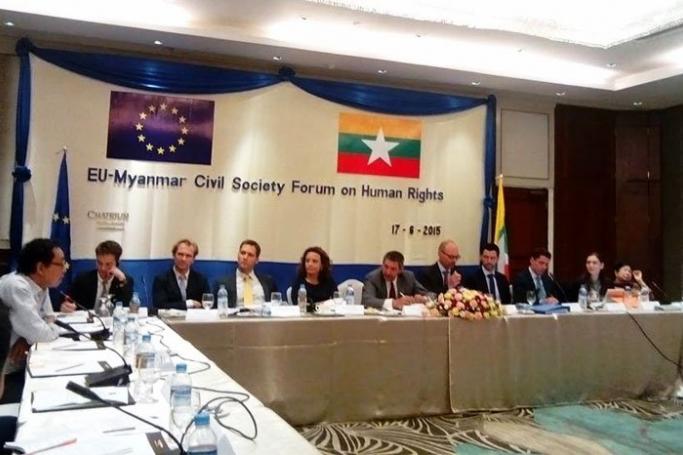The second EU-Myanmar Human Rights Dialogue was held in Nay Pyi Taw on 18 June 2015 according to an official joint statement on 18 June. A Civil Society Forum preceded the Dialogue on 17 June in Yangon, where the human rights situation in both the EU and Myanmar was discussed with civil society and human rights defenders, as well as by bilateral meetings with various stakeholders.
During the dialogue, both sides reaffirmed their commitment to continue and strengthendialogue and cooperation in the field of human rights on the basis of shared values and international human rights standards. The EU underlined its strong commitment to continue supporting Myanmar's democratic transition and reforms and to further deepen bilateral ties on this basis.
On migration, the two sides discussed the main challenges and lessons learned from recent events in the Mediterranean and the Andaman Sea, agreeing on the importance of saving lives and protecting the human rights of the affected populations. The EU welcomed and encouraged regional initiatives to combat people smuggling and human trafficking in countries of origin, transit, and destination and to provide necessary assistance. The EU underlined the importance of addressing the root causes of irregular migration in national and regional contexts, including economic factors and human rights concerns.
Both sides also provided updates on the legal framework for the protection of persons belonging to minorities and ongoing efforts to promote non-discrimination, including in the context of Roma in EU Member States and the situation in Rakhine State. The four bills on the ''protection of race and religion'' were also raised by the EU. Human rights being universal and inalienable, the EU reiterated its concerns over the proposed legislation with Myanmar’s international human rights obligations. In this context, both sides agreed on the need to fight intolerance and incitement to hatred and violence in order to ensure the full enjoyment of human rights for persons belonging to minorities, including freedom of religion and belief.
On land rights, the two sides agreed on the importance of public consultations towards developing an effective legal framework covering access to land, security of tenure for small holder farmers and the resolution of land disputes.
On labour rights, both sides committed to continue cooperation in the framework of the “Initiative to Promote Fundamental Labour Rights and Practices” which the EU joined in May 2015. Myanmar and the EU discussed the need for a strengthened legal framework for labour rights as well as improved law enforcement in order to promote responsible investment and equitable economic growth.
Both delegations agreed that 2015 will be a landmark year in Myanmar's democratisation process with general elections taking place later this year. The EU expressed its expectation that elections will be inclusive, credible, and transparent. Myanmar reiterated its unwavering determination to conduct free and fair elections in accordance with international standards and expressed appreciation of the EU’s recent exploratory mission that assessed the feasibility of sending an EU Election Observation Mission later this year.
While the issue of human rights will continue to be a key aspect of the permanent dialogue between Myanmar and the EU, both sides agreed that the next formal dialogue round should be held in Brussels in 2016.
You are viewing the old site.
Please update your bookmark to https://eng.mizzima.com.
Mizzima Weekly Magazine Issue...
14 December 2023
New UK Burma sanctions welcome...
13 December 2023
Spring Revolution Daily News f...
13 December 2023
Spring Revolution Daily News f...
12 December 2023
Spring Revolution Daily News f...
11 December 2023
Spring Revolution Daily News f...
08 December 2023
Spring Revolution Daily News f...
07 December 2023
Diaspora journalists increasin...
07 December 2023
World Bank rep optimistic about Myanmar’s economy












